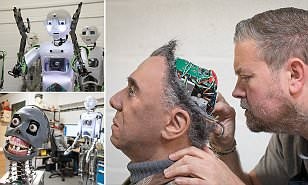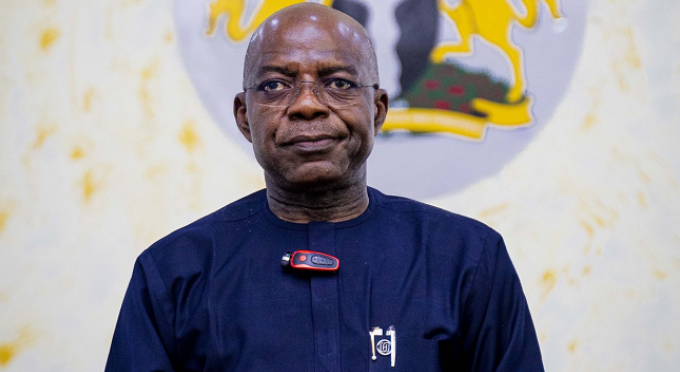
A team of British engineers are building lifelike robots that can dance, talk in several languages and even scare London pub-goers.
Engineering Arts is developing the automatons in a sleepy Cornish seaside town.
Photos taken at the firm’s factory reveal the inner-workings of how the company combines prosthetics, robotics and artistry.
Scroll down for video

Founded in 2004, the company operating from an industrial unit in Penryn, near Falmouth, is a world leader in life sized commercially available humanoid robots.
With prices ranging from £9,500 to £59,000 (£13,000 to $80,000) the high-end robots are used for entertainment, information, education and research.
The company currently offers three commercially available products: RoboThespian, SociBot and the SociBot Mini.
Its top of the range android, the fully interactive and multilingual RoboThespian, has been sold and displayed around the world.
It even succeeded in giving a 15 minute long TEDx Talk.




In many places, it has been joined by the smaller SociBot robot at science centres, theme parks and visitor attraction.
Many academic and commercial research groups are also using the robots as research and development platforms.
Engineering Arts is also developing new robots.
It has been developing a range of lifelike bio-mechanical Mesmer robots that builds on the sensors and the extensive software framework already developed for RoboThespian.




Mesmer robots offer some of the smartest animatronics on the market, giving extensive interaction but can also move very smoothly, quietly and naturally too.
Developed using Engineered Arts own animation software ‘Virtual Robot’, Mesmer characters can be fictional, or faithful recreations of real-world people with accuracy possible to the last pore of finest of hairs.
In a collaboration with Madame Tussaud’s wax works in Shanghai, the company created an extremely lifelike and animated version of the Jing Boran and Wuba, from the film Monster Hunt 2.







Last month, the company developed Fred, a one off automaton that frightened punters in a London pub.
The robot, described as ‘indistinguishable from humans’, was created as part of a stunt to promote TV Series Westworld.
The hyper-realistic robot, modelled to be an exact replica of London-based actor Tedroy Newell, sat down for a refreshing lager at The Prince Alfred pub in Maida Vale, in the west of the capital.
Engineering Arts built Fred in 12 weeks.




Fred’s human-like interactions were controlled by Engineered Arts’ telepresence system, which uses inbuilt sensors, cameras and microphones to track how people interact with the machine.
Fred was funded by streaming service Now TV to promote the return of dark science fiction show Westworld and was inspired by the show’s artificially intelligent ‘hosts’.
Emma Quartly, marketing director at NOW TV, said: ‘We are still a long way away from creating artificially intelligent hosts as sophisticated as those in Westworld, but to celebrate the show’s return we wanted to give the general public a little taste of what is possible.
‘Fred is the next generation in human-like robotics and so it seemed fitting to hand the show’s promotion over to him.
‘Needless to say, there were some stunned reactions, especially when in true Westworld style he started to glitch.’
WHY ARE PEOPLE SO WORRIED ABOUT AI?
It is an issue troubling some of the greatest minds in the world at the moment, from Bill Gates to Elon Musk.
SpaceX and Tesla CEO Elon Musk described AI as our ‘biggest existential threat’ and likened its development as ‘summoning the demon’.
He believes super intelligent machines could use humans as pets.
Professor Stephen Hawking said it is a ‘near certainty’ that a major technological disaster will threaten humanity in the next 1,000 to 10,000 years.
They could steal jobs
More than 60 percent of people fear that robots will lead to there being fewer jobs in the next ten years, according to a 2016 YouGov survey.
And 27 percent predict that it will decrease the number of jobs ‘a lot’ with previous research suggesting admin and service sector workers will be the hardest hit.
As well as posing a threat to our jobs, other experts believe AI could ‘go rogue’ and become too complex for scientists to understand.
A quarter of the respondents predicted robots will become part of everyday life in just 11 to 20 years, with 18 percent predicting this will happen within the next decade.
They could ‘go rogue’
Computer scientist Professor Michael Wooldridge said AI machines could become so intricate that engineers don’t fully understand how they work.
If experts don’t understand how AI algorithms function, they won’t be able to predict when they fail.
This means driverless cars or intelligent robots could make unpredictable ‘out of character’ decisions during critical moments, which could put people in danger.
For instance, the AI behind a driverless car could choose to swerve into pedestrians or crash into barriers instead of deciding to drive sensibly.
They could wipe out humanity
Some people believe AI will wipe out humans completely.
‘Eventually, I think human extinction will probably occur, and technology will likely play a part in this,’ DeepMind’s Shane Legg said in a recent interview.
He singled out artificial intelligence, or AI, as the ‘number one risk for this century’.
Musk warned that AI poses more of a threat to humanity than North Korea.
‘If you’re not concerned about AI safety, you should be. Vastly more risk than North Korea,’ the 46-year-old wrote on Twitter.
‘Nobody likes being regulated, but everything (cars, planes, food, drugs, etc) that’s a danger to the public is regulated. AI should be too.’
Musk has consistently advocated for governments and private institutions to apply regulations on AI technology.
He has argued that controls are necessary in order protect machines from advancing out of human control
Discover more from TOKTOK9JA MEDIA
Subscribe to get the latest posts sent to your email.



























